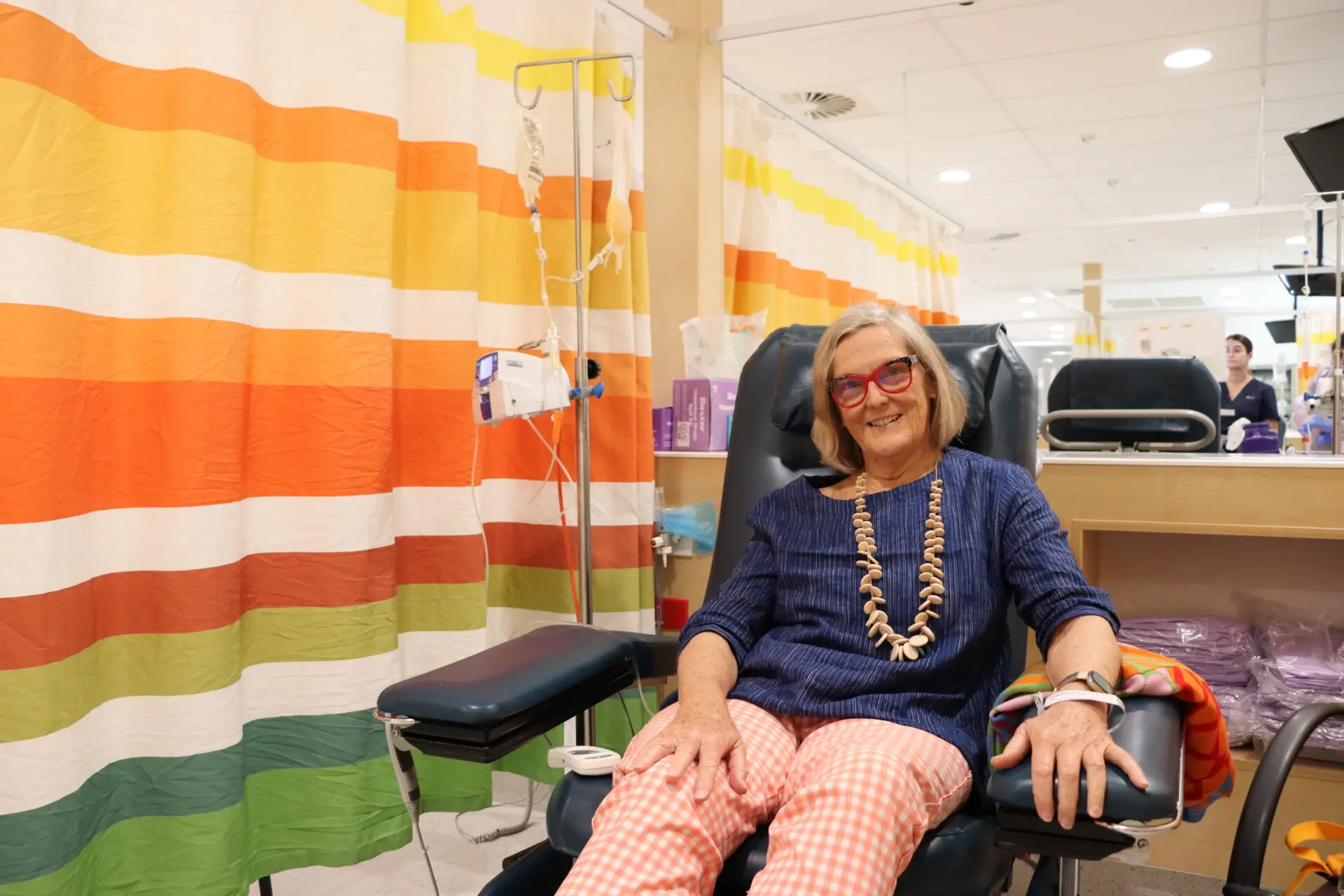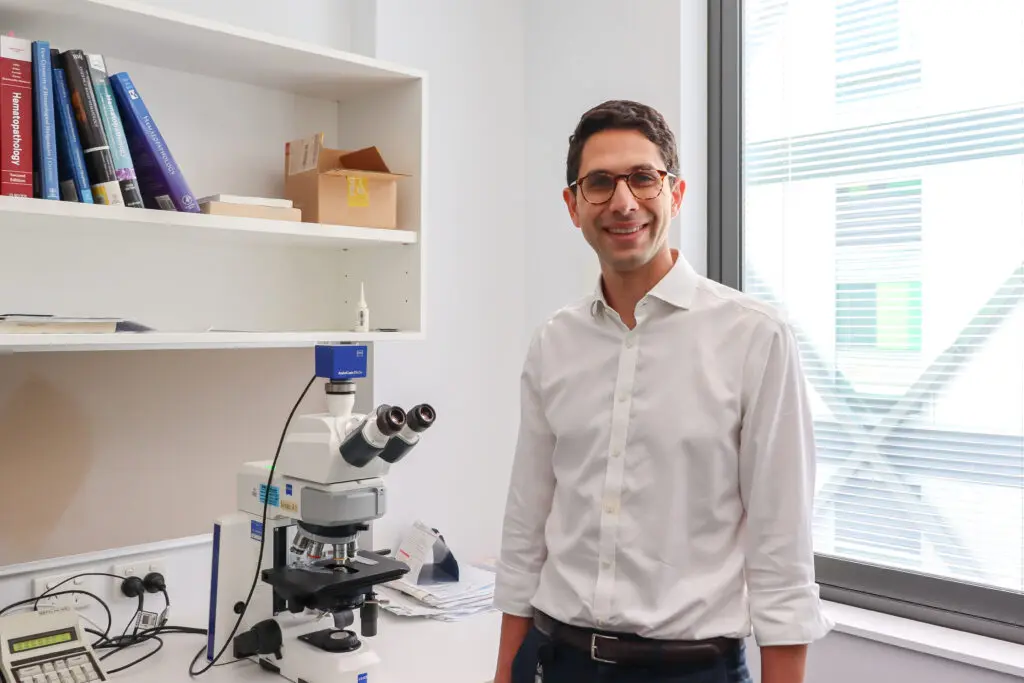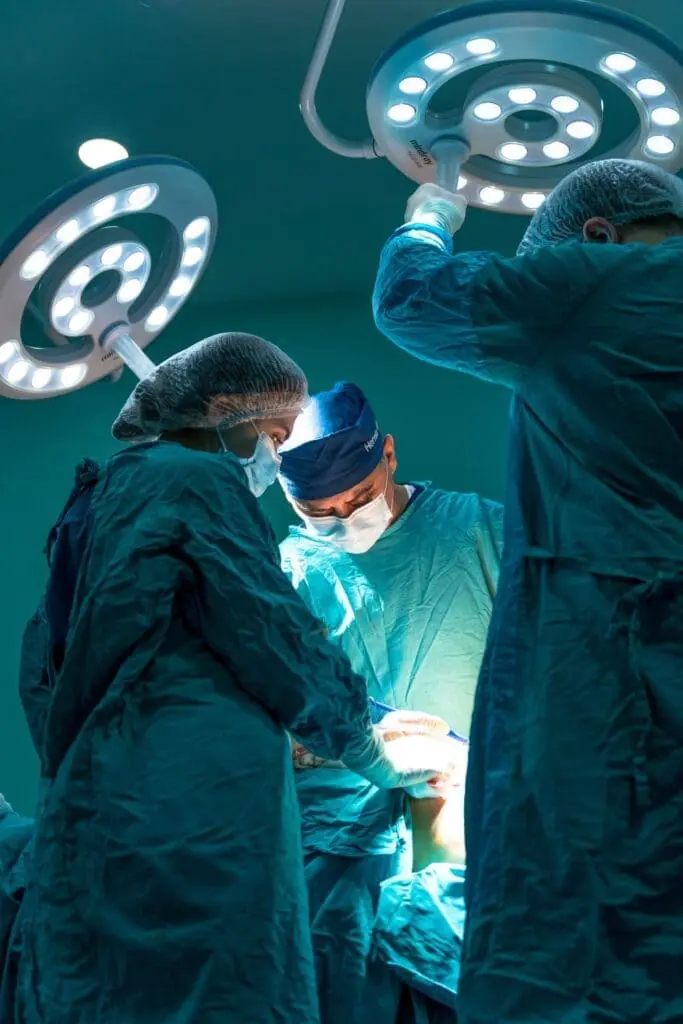
When Sydney local Julie Fidler began feeling unusually tired last July, she thought she just wasn’t as fit as she used to be. She and her partner were preparing for a two-month overseas adventure, starting with a two-week hike in the Swiss Alps. “I complained to a friend that despite all our training, I just wasn’t getting any fitter,” Julie recalls.
A week before their trip, during a hike with friends, her friend Sue noticed something was off. Julie was breathless walking uphill and her legs felt heavy. “Sue was worried about me – she just didn’t think it was normal,” Julie says. She also had bruises she couldn’t explain. With a trip overseas only days away, Julie decided to get checked – a decision that would turn out to be lifesaving.
“I went to the emergency department at Hornsby Ku-ring-gai Hospital feeling a bit ridiculous,” she laughs. “Breaking news: 67-year-old woman gets puffed walking up hills!” But the triage nurse took her seriously, ran an ECG and ordered blood tests. When the results came back, Julie was moved to an isolation room.
“The doctor explained that my blood tests showed some abnormalities and that it was serious,” Julie says. “He’d already spoken to the haematology team at Royal North Shore Hospital.”
By the next morning, Julie was transferred to Royal North Shore Hospital (RNSH), where a bone marrow biopsy confirmed she had aplastic anaemia, a rare condition where the bone marrow fails to produce enough blood cells.
Compassion and care on Ward 8E
Julie was admitted to Ward 8E, home to the hospital’s haematology patients. Her planned trip was replaced with transfusions, tests and a steep learning curve. But she remembers the care she received most of all.
“No one incident or person really stands out,” she says. “What does stand out is that I consistently received professional, expert, and friendly care from every single member of the team.”
Julie recalls nurses diligently managing transfusions, chatting as they weighed her or made her bed, and the warmth of student nurses discovering their new calling. “From my very first presentation in emergency, I was taken seriously and given excellent care and attention,” she says.
Julie’s treating specialist, Dr Jad Othman, a Staff Specialist Haematologist at RNSH, says her decision to come in early made all the difference.
“Her symptoms were quite mild because she is otherwise so fit and well,” he explains. “However, her blood count abnormalities at the time of presentation were relatively severe. Early presentation was critical.”
He adds that aplastic anaemia can be easily overlooked because symptoms such as fatigue or bruising are common and non-specific. “It’s vital for patients and their care teams to be aware of the potential significance of these symptoms.”

Living with aplastic anaemia: treatment and recovery
Treatment for aplastic anaemia is complex and long-term. Julie underwent immune suppression therapy, designed to “reset” her immune system so her bone marrow could recover. She continues to take immunosuppressants and medication to stimulate blood production, along with regular transfusions and blood tests.
Despite the restrictions – no crowds, careful food handling and constant vigilance against infection – Julie’s positivity shines through. “It just feels like COVID lockdown,” she jokes. “I’m still able to go for long walks (no hills) and do yoga at home.”
Dr Othman says recovery is measured in milestones: finishing initial therapy, being discharged, and most importantly, seeing blood counts rise on their own. “Treatment continues for one to two years,” he explains. “The goal is maintaining good blood counts once therapy is withdrawn, as relapse can occur at that time.”
Recent advances have brought new hope. “The addition of eltrombopag, a drug that stimulates platelet production, has improved response rates,” says Dr Othman. “It’s made a real difference for patients.”
Giving back after aplastic anaemia treatment
Julie is now channelling her gratitude into giving. As a Director of Ku-ring-gai Financial Services Limited, which operates the Lindfield Community Bank branch of Bendigo Bank, she participates in an annual ‘Director’s Grant’, where each board member chooses a charity meaningful to them.
“No group can be more significant to me right now than the NORTH Foundation, which supports the work of Hornsby Ku-ring-gai and Royal North Shore Hospitals,” Julie says.
Her $1,000 ‘Director’s Grant’ will support the haematology team that cared for her so expertly and kindly. “We have the most wonderful health system in this country,” she says. “The expertise, facilities and treatments available to every Australian are incredible. The NORTH Foundation knows where support is most needed.”
Dr Othman says the team on Ward 8E deeply values that recognition.
“Our nurses and allied health staff are world class,” he says. “They’re knowledgeable, experienced, and – most importantly – they care deeply. They do whatever it takes to get the best outcomes for patients.”

Looking forward
Julie’s recovery will take time, but she’s optimistic. “The first sign of recovery will be when my blood counts start to go up by themselves,” she says. “That will mean my bone marrow is recovering and starting to make new cells.”
She’s already dreaming of her next adventure. “I might not be ready for the Alps,” she laughs, “but once I’m well enough, I hope to hike again and pick up some of the adventures we had planned!”
Dr Othman shares her hope. “Julie has a positive outlook, keeps herself extremely healthy, and is meticulous in following her treatment. She’s giving herself every chance for a good outcome.”
A message of gratitude
For Julie, the journey has been humbling and inspiring. “If you’re on a health journey of your own, cherish any offers of support from family, friends or community groups,” she says. “You need people in your corner.”
Her gift to the NORTH Foundation is her way of saying thank you to the doctors, nurses and staff who helped her through a frightening diagnosis.
“I’m incredibly grateful,” she says simply. “For the care, for the expertise, and for the kindness that carried me through.”
Julie’s story is one of early action, expert care, and gratitude. You can help others facing life-threatening blood disorders receive the same compassionate, world-class care. Support haematology services at RNSH by donating here:
